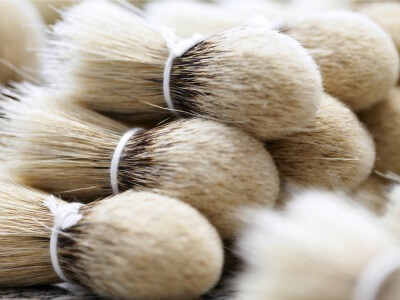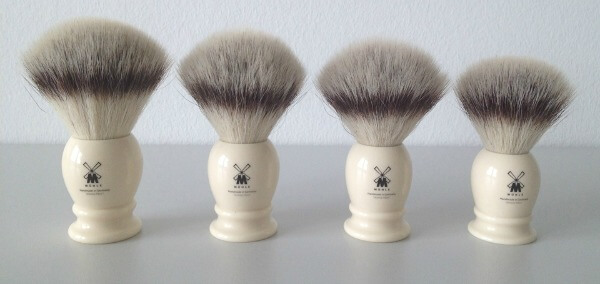When I took up wet shaving seriously several years ago, I was astonished at the number of razors, blades, soaps/creams and brushes that were available. I spent weeks reading and learning about them before making any purchases. My research into brushes was the most confusing for me. I knew nothing about brush knots or lofts, or whether badgers were better than boars. What I did know was that I did not want a synthetic brush. The reviews I read about them at the time were not encouraging.
A short time later, I began to see references to new synthetic brushes from Mühle. The claims seemed contrary to what I had been reading. Then I acquired a Mühle Black Fibre brush, and shortly afterwards, a Silvertip Fibre model. I was very impressed with both, and eventually built my entire brush collection around them.
I felt there had been a paradigm shift with synthetic brushes, and worked with a team of brush experts to examine the new generation of synthetic shaving brushes that has appeared since 2010. Mühle led the way in developing this new generation, in my opinion, and continues to be at the forefront of new fiber and brush development.
I recently had an opportunity to conduct an interview Christian Müller, General Manager of MÜHLE/ Hans-Jürgen Müller GmbH & Co. KG, who along with his brother Andreas (co-General Manager), has been responsible for remarkable advancements in synthetic shave brushes:
Q: Mühle has been involved in developing synthetic shaving brushes for some time now. What can you tell us about general developments over the years?
A: “Synthetic shaving brushes have been around for a number of years, however with less attention to the public compared to traditional badger and boar shaving brushes. We always looked at synthetics differently and saw great potential developing them further, which we did over the past four years.”
Q: What would you consider to be the most significant developments during that time?
A: “The major step was to create a fibre that mimics the properties of natural hair (flex of the fibres and water retention). Another aspect was the modification of the appearance to make it look more natural. An additional goal was to add density to the bundles, which was achieved by reducing the diameter of the single fibers.”
Q: Synthetic brushes, especially the new generation that has recently become available, have created considerable interest in the shaving community. Are you seeing any changes in the market response for synthetic brushes?
A: “Due to the increasing demand for shaving brushes and the limited availability of natural hair, I believe there is significant potential for synthetic shave brushes. We already note a very positive market response without any prejudice against these new fibres.”

Q: In what ways do synthetic fibers differ from natural badger and boar hair? Do they offer any advantages or challenges for brush manufacturers?
A: “As mentioned earlier, the main challenge was to take out the flex and make them to retain water. The advantage is the homogeny of the material. I cannot discuss in detail how we accomplish this.”
Q: My first synthetic brush was a Mühle HJM Black Fiber brush, and I currently have several Mühle Classic Silvertip Fiber brushes. Readers often ask the differences between them. How would you characterize the differences?
A: “The STF was made as an alternative to super badger, in terms of appearance and characteristics. All bundles are tied by hand, the process is exactly the same as for the more exclusive badger hair brushes, with focus to detail. The STF bundles are made of various length fibres which adds density and backbone to the brush. Black Fibre is a machine-made grade, more price sensitive, the fibres are of one length and slightly thinner which allows us to have more control when processing it through the machine.”
Q: In talking with you, I’ve been struck by your knowledge of discussions among members of the shaving community. Do you or others at Mühle monitor online discussion forums or other media?
A: “Always, it meanwhile belongs to our daily business to browse the forums. This input tremendously helps to improve the products. There seems to be a lot of knowledge amongst the members of the various forums and we are sometime struck on how much people get into detail about the products. I will be attending the Great Shave Seminar event by Merz Apothecary in Chicago this month and looking forward to get to know some of the forum members.
Q: Are you personally involved in the conception, design and production aspects of shaving brushes?
A: “Mainly my brother Andreas and I work closely together on all aspects of production.”
Q: What is approximate length of time between initial concept and actual distribution of a new brush design?
A: “This really depends on the product and the complexity of developing it. The fibres took quite a long time–four years in total before we felt it is ready for the market.”
Q: What will the future offer? Can we look forward to any new developments?
A: “There have been a good number of new products this year already, just to mention the new Mühle Organic Skincare line as well as the new stands for our DE series. Furthermore, we have worked on product refinements such as for the fibres and various shaving sets and razors. There will be a lot more in the next three months and in 2013.”
Author’s Note: I’d like to thank Christian Müller for participating in this interview, and remind readers that he will be appearing at the Great Shave Seminar event in Chicago on October 24th.



I am blessed to own a 26mm knot “Extra Silvertip” from Rodney Neep. If it can be matched I’ll be the first in line…until then, sorry Badger, you’re about to get nekkid!
Rod is an excellent artisan. Stand alone synthetic knots are available direct from Muhle that can be used by artisan brush makers.
I have to say it looks promising, I cannot wait until a good synthetic Shaving Brush comes to Market. I would be the first to sell and promote it to my clients! But I still haven’t seen one that equals Badger Hair, or should I say tested one. But I have tried some that come close for example Edwin Jagger came out with a new brush that is coming very close. I imagine the break through is just around the corner. Fingers crossed! Nice Article!
Kind Regards,
Phil and Jane
The Classic Edge Shaving Store
I love Muhle’s high quality products.
I have a 19mm silvertip from Muhle, also a 21mm Silvertip Fibre (faux ivory) and a 23mm Silvertip Fibre (faux horn) is on it’s way here. I further own both the R89 and R41 Muhle razors.
No doubt synthetics are the future, since one day day will surpass natural in every way buy a large margin. To me STF is already better in most (important) ways.
I agree that Mühle’s new synthetic brushes do have advantages over naturals in lather-making, economy of purchase and use, quality, ease of cleaning and longevity–in addition to being vegan products. Mühle’s continuing refinements in fibers has resulted in even softer denser brushes with less springiness and improved heat retention and lofts that more closely resemble those of naturals.
I was already looking forward to getting a new brush from the Muhle synthetic line. This interview just made my anticipation that much greater. I really enjoy this site!
Pingback: Sixth edition links « Later On
Love my Black Fibre Brush; it has replaced by herd of badgers. Despite the number of silvertips I own, I was never comfortable with using animal hair. This brush is good with creams and soaps. Previous synthetics, for me, either did not lather soaps well, or if they did, they would shred your face.
I am concerned that the black fibers are just treated Taklon, and they are charging a pretty penny for a modified synthetic Kabuki makeup brush. Not that the brush wont work.
Thanks for the interview. Though I guess he had to be pretty tight lipped about some things. I have a 21mm and a 25 mm “synthetic silvertip” myself. Excellent brushes with great performance characteristics. Love the fast drying time too.
Comments are closed.